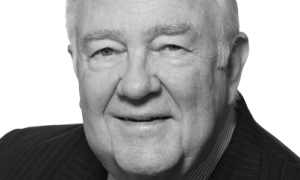When Ronald Reagan took office on Jan. 20, 1981, our nation faced serious problems. We were in the greatest economic crisis since the Great Depression of the 1930s, with high unemployment, major energy shortages, interest rates of over 21 percent, and inflation at 12.5 percent.
Our military capability had deteriorated in the aftermath of the Vietnam War. Observers claimed that we had planes that couldn’t fly due to lack of spare parts, ships that couldn’t sail for lack of trained crews, and army tanks and artillery pieces that could not maneuver for lack of fuel and ammunition.
In foreign affairs, our status as a world leader had declined to its lowest point in modern history. Many questioned whether Americans still had confidence in our institutions and whether we had lost our traditional “can do” attitude. This was the country that Ronald Reagan inherited.
Eight years later, when Reagan left office, he had revitalized the economy, rebuilt our military capability, restored our position of world leadership and revived the spirit of the American people. He had set in motion the forces that led to the end of the Cold War, with the West winning and millions of people gaining their freedom from tyranny. His strategy of confronting the Soviet Union on a moral, military and diplomatic plane ultimately led to the implosion of that regime.
How did Reagan, who had been derided by his opponents at the time of his nomination as “merely an actor,” accomplish so much and lead our nation back to its preeminent position as “the world’s sole superpower?” He accomplished this by relying on several outstanding attributes of leadership.
First, he had a vision of where the country should go. In dealing with the economy, he had managed as governor of California to bring into balance a budget that would have been the seventh-largest economy in the world if it were a nation. He applied the same concepts and extensive study to developing his vision for resolving the economic challenges facing America.
His first personal experience with communism was in the 1940s, when he led the unions of the motion picture industry in resisting an attempted takeover by the Communist Party USA, which wanted to use movies for propaganda purposes. That experience led him to study communism in both its domestic and international forms. From that he derived his plan to engage the Soviet Union morally, militarily, and diplomatically. This vision was mentioned throughout the campaign and its implementation was initiated as soon as he became president.
Reagan had an exceptional ability to communicate his vision to the people, as well as to Congress and other political leaders. That vision became the principal plan for the new administration. Its fundamental aspects were enacted within his first year in office.
Another attribute of Reagan was his courage, both physical and moral. He demonstrated this on numerous occasions, including when he was shot, when he upheld the law during the air traffic controllers’ strike, and when he stood up to Mikhail Gorbachev to defend the Strategic Defense Initiative.
Throughout his career, Reagan was committed to absolute integrity. His trustworthiness was recognized by those he dealt with in Congress, in politics, and foreign leaders throughout the world.
An additional strength was his perseverance. He often said that when in negotiations, whether with Congress or other nations, he was willing to accept “half a loaf,” if that was all he could get, but then immediately start again to get the rest.
Beyond these qualities, one of Reagan’s most significant characteristics was his optimism and cheerfulness. His ability to take opposition or even defeat in stride, without it deterring him from his objectives, enabled him to provide the leadership that inspired his followers and the country at large. His personal relations with others also contributed to his ability to get things done. He always respected people, even those who were his adversaries. That friendliness and appreciation for the dignity of others often won over those who had initially been his opposition.
Obviously not everything went well during his administration. There were difficulties, disappointments and setbacks. But his leadership skills and personality, and his willingness to share credit with others for anything that had been achieved, enabled him to become one of our nation’s most outstanding presidents.
General Meese, a former resident of La Mesa, is the Ronald Reagan Distinguished Fellow at The Heritage Foundation.
First appeared in The San Diego Union Tribune



